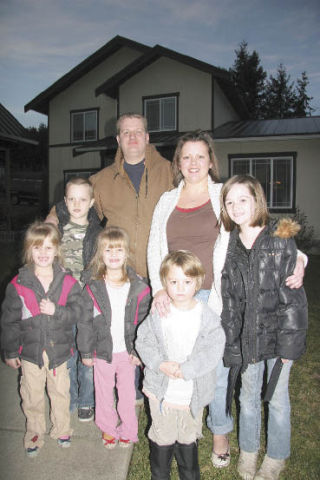Becoming a Habitat for Humanity family meant changes big and small for the Willhight family of seven.
For oldest daughter Erica, the move to their Snoqualmie house last September provided her with her very own room.
“It’s pretty awesome,” the 9-year-old said.
“At our older house, I had to share with a boy,” said Erica, who attends Opstad Elementary. Her little brother Caleb “made a huge mess all the time.” The family’s move gave her a better place to do her homework.
After years renting less-than-ideal living spaces, a Habitat home provides the Willhights — father Jason, mother Melinda, and children Erica, Isaiah, Caitlyn, Chloe and Caleb — with a stable, healthier place to live. It also gives the five active children a little more elbow room.
Two Valley families, the Willhights and the McKenzie-Munros, both celebrated becoming first-time homeowners in a dedication held by Habitat for Humanity last month. Both families live in the Koinonia Ridge development in Snoqualmie.
That moment was a big weight off the shoulders for mom Melinda Willhight. The emotional dedication, held Saturday, Jan. 10, in the Koinonia Ridge Community Center, capped the months of work and help by many people that saw the two families become homeowners. For Melinda, the road to Habitat homeownership was a powerful experience.
“I’d recommend it to anybody,” she said.
Less stress
For the last three and a half years, the Willhights lived in a three-bedroom, two-bath home in North Bend. Their five children shared two bedrooms, and the family battled inadequate plumbing, toilet leaks, broken showers, drafts and mold.
Since their move to the refurbished four-bedroom home, life for the Willhights has been less stressful.
“We have less clutter,” Willhight said. “There is a lot of space we think we need to fill, but we’re not going to.”
Christmas was more fun this year, because there was room to walk around with a tree.
How Habitat works
Habitat for Humanity of East King County is a grassroots Christian organization that builds homes through a self-help program. Habitat’s mission is to help all Eastside residents find decent, affordable housing through home ownership.
Emily Fortman, Family Services Manager for Habitat for Humanity of East King County, told the Valley Record that the organization provides low-income families with a “hand up, not a hand out.”
“By providing a low-income family with the opportunity to own a home and grow roots in a community, we are not only benefiting the individuals in the household, we are benefiting the community at large,” she said.
Families selected to partner with Habitat buy their homes at cost on zero-interest loans after completing 500 hours of volunteer work, or “sweat equity.” Loans are provided by Habitat.
Habitat uses a land trust model to keep homes reasonably priced, and affordable in the long term. Families own the building and are a part of a homeowners association, which maintains common areas and does repairs and maintenance. If homeowners decide to sell their home, Habitat will buy it back and resell it to another qualified family.
Families must also go to homebuyer education courses before purchasing their homes. Courses include budgeting, home repair and maintenance, stress management and other topics. Families earn sweat equity for completing these courses. They can also have some of their volunteer hours donated by friends, family or co-workers.
The average total cost for housing is about $800 per month. No down payment is required, although families are encouraged to save money to help cover the cost of closing and escrow fees.
To identify families for housing, Habitat conducts extensive outreach campaigns, works with social service providers, caseworkers and affordable housing organizations, and advertises through word-of-mouth, flyers, the Internet, volunteers and public forums.
Selection for homes in the Koinonia Ridge development in Snoqualmie, which includes 50 homes, is coming to an end. Future home developments will be in Issaquah Highlands, Carnation and Renton.
Families interested in Habitat’s homeownership program can attend an informational meeting, which outlines qualifications for the program. Meetings are held in libraries around the county.
Meeting dates, locations and times may be found on the Habitat Web site at www.habitatekc.org/homeowners/homeownership.html.



